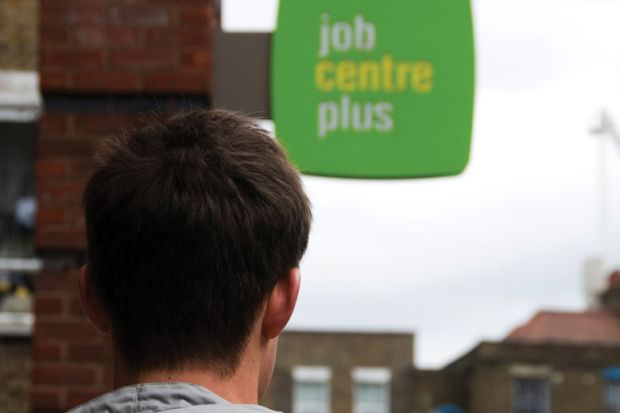A social scientist’s controversial book on the link between antisocial behaviour traits and being long-term unemployed has been branded unethical, substandard and likely to foment hatred in a university debate likened to a scholarly “bare-knuckle boxing match”.
Adam Perkins, a lecturer in the neurobiology of personality at King’s College London, faced fierce criticism over his book, The Welfare Trait, during a lecture at the London School of Economics that he described as the “first ever discussion of personality and the welfare state”.
The lecture was due to be held in February but was postponed because of fears that it could be disrupted by disability activists, who claim that Dr Perkins stigmatises welfare recipients by suggesting that many are inherently work-shy rather than victims of circumstances.
His claim that many long-term employed will pass on an “employment-resistant personality” to their children, contributing to a proliferation of a work-shy underclass, has also been likened to eugenics.
Others have also claimed he is an apologist for cutting welfare benefits for the UK’s poorest families, which some believe would discourage workless families from having more children.
His supporters – including Spectator columnist Toby Young – have claimed that Dr Perkins is the victim of “liberal McCarthyism”, leading to his being blackballed for his controversial, but what they see as common sense, views.
Dr Perkins told the LSE audience on 29 June that his theories were “not just pub talk” and there was a huge amount of literature to support the idea that the “welfare state could increase worklessness”.
But responding to Dr Perkins’ lecture, Kitty Stewart, associate professor in social policy at the LSE, attacked not just the King’s scholar’s ideas but the “very low” quality of analysis used in The Welfare Trait.
“This book fails to meet basic standards of social research,” said Dr Stewart. “It repeatedly cherry-picks evidence, presenting one or two studies, ignoring contradictory evidence,” she added.
Dr Perkins’ book also “frequently misrepresented” literature, with “details given out of context, selectively, or exaggerated to make a point”, and one small qualitative study was “relied on heavily”, Dr Stewart said.
That study – a 1969 study of 33 troubled families in Sheffield identified by social services – did not provide a useful insight into the welfare state, on which half the UK population have relied on at some point in the past 18 years, said Dr Stewart. For instance, the study’s claim that welfare-recipient families spend money on chocolate and alcohol was contradicted by a huge weight of evidence that suggested extra support is actually spent on fruit and fresh food among other things, she explained.
“This book runs counter to the code of ethics that we, as academics, implicitly sign up to,” added Dr Stewart of The Welfare Trait, adding that it was likely to “foment antagonism” against marginalised groups on "no solid evidence".
Dr Stewart also took aim at Dr Perkins’ concept of the “employment-resistant personality”, which he has suggested is more likely to be found among the long-term employed and their children than those in work.
“The idea that we can kick out an employment-resistant trait does not appear to hold up,” she said, adding that there was “no evidence” to support the concept of a “welfare claimant gene”.
“It is feeding into myths about who benefit recipients are,” Dr Stewart told Times Higher Education.
The debate was described by event moderator Jason Alexander, an LSE philosophy professor, as an example of “academic bare-knuckle boxing”, while one Twitter user likened the level of conflict to that seen on The Jeremy Kyle Show.
Responding to Dr Stewart’s criticisms, Dr Perkins said that his ideas were in line with those of welfare state founder William Beveridge and that he wanted more pre-school support for low-income households as it paid off dramatically in the long run.
“Once a child has been born we should throw everything at them to help, but we should also have a look at policy in case it is causing extra children [in workless households] to be born,” he said.
Dr Perkins said during his talk that most people who face unemployment “do not need much of a nudge to get back into employment, but there is subsection of people who are resistant to employment no matter how much help they are given”.
“We are not all the same and, if we assume we are the same, it does not do justice to the welfare debate or justice to those who are trying to make an independent life on their own,” he added.
Register to continue
Why register?
- Registration is free and only takes a moment
- Once registered, you can read 3 articles a month
- Sign up for our newsletter
Subscribe
Or subscribe for unlimited access to:
- Unlimited access to news, views, insights & reviews
- Digital editions
- Digital access to THE’s university and college rankings analysis
Already registered or a current subscriber? Login





